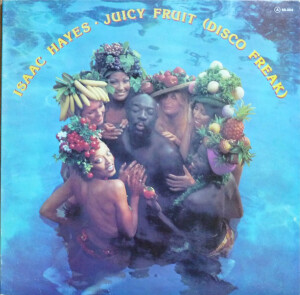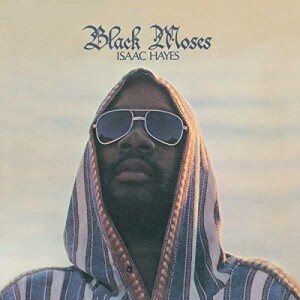 Isaac Hayes passed away August 10, 2008. Many people only know him as the composer of the “Theme From Shaft” or as the guy on South Park, but to some of us he was a lot more. In the Shaft era he played at the university where I am employed. And he hired a string section from local musicians. My boss was a fiddle player and took the gig. He used to come to work every day wearing a bow tie, so we teased him about having to give up his bow tie for gold chains. He claimed that Isaac Hayes was a pleasure to work for, that he knew what he was doing. And I’ll tell you, these personal touches made the loss of Isaac Hayes a lot more real for me. Now we can celebrate. The rejuvenated Stax Records has just reissued a couple of Hayes’s albums from the ’70s in deluxe packages, and they are great to look at and listen to.
Isaac Hayes passed away August 10, 2008. Many people only know him as the composer of the “Theme From Shaft” or as the guy on South Park, but to some of us he was a lot more. In the Shaft era he played at the university where I am employed. And he hired a string section from local musicians. My boss was a fiddle player and took the gig. He used to come to work every day wearing a bow tie, so we teased him about having to give up his bow tie for gold chains. He claimed that Isaac Hayes was a pleasure to work for, that he knew what he was doing. And I’ll tell you, these personal touches made the loss of Isaac Hayes a lot more real for me. Now we can celebrate. The rejuvenated Stax Records has just reissued a couple of Hayes’s albums from the ’70s in deluxe packages, and they are great to look at and listen to.
The important one is, of course, the big double album, with the foldout sleeve, but we’ll get to that in a moment. First, Isaac Hayes’s disco album Juicy Fruit (Disco Freak) in a miniature bi-fold LP sleeve replicating the original 12-inch sleeve. Ike is standing up to his waist in water, surrounded by a half-dozen topless beauties. The girls are wearing hats made of fruit, bananas, pineapples, grapes, apples, mmmm … juicy! But it gets juicier. On the back Ike leaps out of the water with a banana in his teeth, the girls’ breasts are shielded by fruit pasties or leis. And inside…the gang of seven stand in a line – all you see are their feet. Fourteen feet, each pair … with their underwear dropped to their ankles. Juicy! And I just noticed, the lyrics are there too, in type far too small to be employed in a singalong.
Not that you’d be singing along anyway. Track one is the title song, and it’s essentially a lot of rapping over a riff … party talk, for two minutes til the music breaks in, against a solid disco beat. You can dance to it … and Ike’s voice is not the mellifluous basso of “Shaft” but more like a ragged baritone. Funky but dispensible. It keeps up that way for most of the album. It’s all very professional, well arranged and played, but overwhelmed by the flavour of the day, which was the disco thing. Everybody went disco, the Bee Gees, the Beach Boys, even the Rolling Stones. Isaac Hayes was closer to the origin of the genre, so this is probably more authentic, but having lived through the era, let me declare right now, I am not interested in re-living it. I have noticed my feet tapping, though, while this album plays.
 The other album is the important one. Black Moses was a deluxe two-record set, with a snazzy multi-fold cardboard sleeve that opened in the shape of a cross, with Hayes in Moses garb at what might be mistaken for the shore of the Red Sea. Inside is a photo of a shirtless Hayes wearing shades and gold chains. This is the bandleader who appeared in my town. The credits appear inscribed on tablets like the 10 Commandments and liner notes are written in an Old English typeface; very Biblical looking. I’ve spent a long time describing the packages these discs come in – for downloaders, you might think too much time, whereas for old timers like me a big part of the excitement of new records was the album cover art, a lost art in some ways. But it’s the music that matters here and it’s classic Isaac Hayes. Orchestral grooves with a richness of strings and horns, a strong rhythm section pulsing a solid sexy beat, and Hayes’s deep voice singing the lyrics of love. He covers “Never Can Say Goodbye” which was a big hit for The Jackson 5, the Carpenters’ “Close To You” and songs by Curtis Mayfield, Gamble-Huff-Butler, Bacharach-David and Kris Kristofferson. He covers them, but he owns each song, replacing the composers’ sensibilites with his own. He turns every song into an Isaac Hayes song. He’s faithful to the melody and the lyric, but he manages to put his own stamp on them all. Compare his originals with the covers, and it’s all about arrangements and performance.
The other album is the important one. Black Moses was a deluxe two-record set, with a snazzy multi-fold cardboard sleeve that opened in the shape of a cross, with Hayes in Moses garb at what might be mistaken for the shore of the Red Sea. Inside is a photo of a shirtless Hayes wearing shades and gold chains. This is the bandleader who appeared in my town. The credits appear inscribed on tablets like the 10 Commandments and liner notes are written in an Old English typeface; very Biblical looking. I’ve spent a long time describing the packages these discs come in – for downloaders, you might think too much time, whereas for old timers like me a big part of the excitement of new records was the album cover art, a lost art in some ways. But it’s the music that matters here and it’s classic Isaac Hayes. Orchestral grooves with a richness of strings and horns, a strong rhythm section pulsing a solid sexy beat, and Hayes’s deep voice singing the lyrics of love. He covers “Never Can Say Goodbye” which was a big hit for The Jackson 5, the Carpenters’ “Close To You” and songs by Curtis Mayfield, Gamble-Huff-Butler, Bacharach-David and Kris Kristofferson. He covers them, but he owns each song, replacing the composers’ sensibilites with his own. He turns every song into an Isaac Hayes song. He’s faithful to the melody and the lyric, but he manages to put his own stamp on them all. Compare his originals with the covers, and it’s all about arrangements and performance.
Black Moses is a dandy “make-out” album if you remember what that used to be. It’s also funky and melodic, danceable and suggestive. I love it. Good job, Stax. Stax has come back stronger than ever, with new releases (like Eddie Floyd), compilations and re-issues. Good job, indeed! Welcome back.
(Stax, 1971/2009)
(Stax, 1976/2009)
